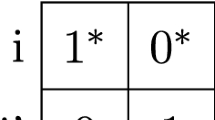Abstract
Games with frequency-dependent stage payoffs (FD-games), are infinitely repeated non-cooperative games played at discrete moments in time called stages. The stage payoffs depend on the action pair actually chosen, and on the relative frequencies with which all actions were chosen before.
We assume that players wish to maximize their expected (limiting) average rewards over the entire time-horizon. We prove an analogy to, as well as an extension of the (perfect) Folk Theorem. Each pair of rewards in the convex hull of all individually-rational jointly-convergent pure-strategy rewards can be supported by an equilibrium. Moreover, each pair of rewards in same set giving each player strictly more than the threat-point-reward, can be supported by a subgame-perfect equilibrium. Under a pair of jointly-convergent strategies, the relative frequency of each action pair converges in the long run.
Similar content being viewed by others
Author information
Authors and Affiliations
Corresponding authors
Additional information
Received: March 2002/Revised: January 2003
Rights and permissions
About this article
Cite this article
Joosten, R., Brenner, T. & Witt, U. Games with frequency-dependent stage payoffs. Int J Game Theory 31, 609–620 (2003). https://doi.org/10.1007/s001820300143
Issue Date:
DOI: https://doi.org/10.1007/s001820300143




